关于网络热词的英语作文
论网络流行语英语作文

论网络流行语英语作文论网络流行语英语作文(通用23篇)在学习、工作、生活中,大家都经常接触到作文吧,作文可分为小学作文、中学作文、大学作文(论文)。
为了让您在写作文时更加简单方便,下面是小编为大家收集的论网络流行语英语作文,仅供参考,希望能够帮助到大家。
论网络流行语英语作文篇1Should Internet Slang Be Prohibited?At present, Internet Slang, such as “GG, MM, Xia Mi”,has become popular among the teenagers.There are different opinions on Internet Slang. Some students think Internet Slang is vivid, fashionable and full of humor and intelligence. Besides, it makes chatting on the Internet quicker.However, some other students think Internet Slang lacks depth of thought and is too simple. Also, it is hard to understand and not accepted by most people. The words sometimes might make people confused, even resulting in misunderstanding.Every coin has two sides. In my opinion, living in the Information Age, if we don’t know the Internet Slang, we seem to fall behind the times. It will be OK as long as these terms are used correctly in proper situations.论网络流行语英语作文篇2In such a networked society, people are tend to use hot words on the internet, which has been tagged with fashion and trend. These buzzwords are formed with the popularity of internet, which means that without the internet those works make no sense. But we can’t den y that they do enrich our communication words and contribute a lot in entertainingpeople. Internet buzzwords are extremely popular in the internet used by netizens, especially in the microblog, even in the students’ examination paper.In my point of view, internet buzzwords are undoubtedly hot and fashionable on the internet, but in the real life people are not so familiar with those words. Some people feel puzzled at those words. In other words, internet buzzwords can only make sense with the context of internet. Therefore, these words are limited in certain condition and can’t be generalized for their unfamiliarity to some people. They aren’t supposed to be encouraged in the students’ examination paper, which is formal and should be taken seriously.论网络流行语英语作文篇3The Internet is a particularly magical "net" woven by man in the 1960s with infinite and magical wisdom, and is the common word of The Times. But it ties the world closer together.What exactly is the web like?When I was a child, there was no Internet. Just playing carefree, don't worry if someone turns off your monitor. When I was a child, there was no Internet world so sad! I can't find my favorite cartoons, and I can't see funny toys.Slowly, growing up, I went into the world of the Internet. It brought me not only joy and sorrow, but also my love and hatred for it. During the fourth grade vacation, I was hooked on the TV series, so the Internet became the connection between me and the TV series. I love the Internet because it makes me happy. I hate the Internet because it keeps me from having good eyesight all the time. The school opened, I got the knowledge from the glasses, I met the problem of perplexed, the network helped me solve, I love the network, because it solved the mystery in myheart; I hate the Internet because it makes me lose my motivation for knowledge exploration.The Internet is synonymous with entertainment and a treasure trove of knowledge. The web is sometimes powerful and sometimes weak; The Internet can lead me to the road to success; Or let me fall into the abyss...When I was a child, I didn't think it would be painful and boring. Until now, I learned that the Internet has enriched our lives, but not our lives. The Internet can only imitate our feelings, but it can't replace our feelings.In my opinion, the Internet, more like doctors and butchers. 论网络流行语英语作文篇4In recent years, accompanied by the widespread expansion of network, Internet fraud has become an increasingly serious problem. As far as I am concerned, the following reasons could account for this problem.In the first place, quite a lot of lazy people are seeking wealth but do not want to do anything with their own hands, so they are trying all kinds of ways to defraud money and property on the Internet. Another reason is that those who are likely to be deceived are anxious to get things on the cheap. That makes the frauds possible.To avoid being deceived by the frauds, we should not be greedy for small advantages. At the same time, do not click unknown links. As long as we keep ourselves alert, frauds will have no chance.论网络流行语英语作文篇5there is a phenomenon that teenagers love to play online games nowadays. Some of them seriously consider these games as a job and some people just play as a hobby or interest.However, at the same time many people are addicted to them and can't get away.Attitudes towards online games vary. On the one hand, games relax us after long hours of work or study. We can gain pleasure from the artificial world in games and satisfy our mind.What's more, we may make good friends with many players in games and improve our communication skills.On the other hand, addiction to online games often takes people lots of time especially students. In my opinion, it's necessary for our students to achieve the balance between study and games. In this way, our teenagers could live comfortable lives. 论网络流行语英语作文篇6Primary Students Should Keep Far from the InternetThe Internet becomes very popular in our life. It brings many advantages, but I think we primary students should keep far from the Internet.Firstly, we should focus on our study, so we can’t spend too much time on the Internet. We can be easily addicted to it. Secondly, there is much harmful information on the Internet. They would do harm to us. Finally, surfing the Internet for too long is harmful to our eyesight.Therefore, primary students should stay far from the Internet.【参考译文】远离网络的英语作文网络在我们的生活中很受欢迎,它带来了许多好处,但是我认为学生应该远离网络。
网络热词写进作文
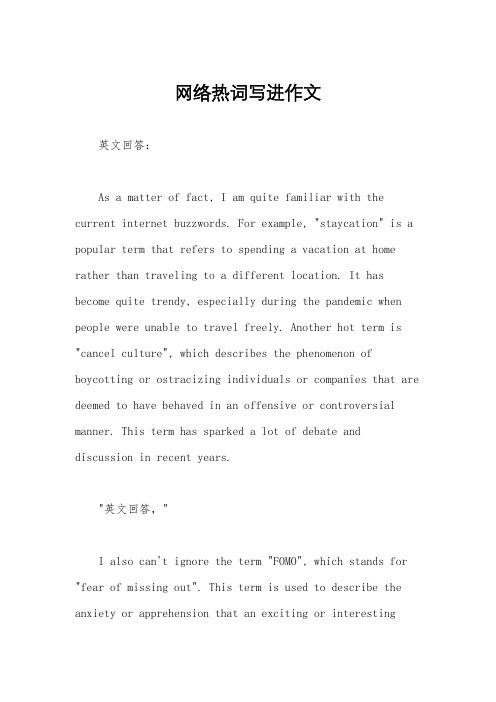
网络热词写进作文英文回答:As a matter of fact, I am quite familiar with the current internet buzzwords. For example, "staycation" is a popular term that refers to spending a vacation at home rather than traveling to a different location. It has become quite trendy, especially during the pandemic when people were unable to travel freely. Another hot term is "cancel culture", which describes the phenomenon of boycotting or ostracizing individuals or companies that are deemed to have behaved in an offensive or controversial manner. This term has sparked a lot of debate and discussion in recent years."英文回答,"I also can't ignore the term "FOMO", which stands for "fear of missing out". This term is used to describe the anxiety or apprehension that an exciting or interestingevent may currently be happening elsewhere, often arousedby posts seen on social media. I think many people canrelate to this feeling, as social media has a way of making us feel like we're missing out on something. Another term that has gained popularity is "woke", which refers to being aware of social and political issues, especially relatingto racism and social injustice. It's important to stay woke and be informed about what's happening in the world."中文回答,"实际上,我对当前的网络热词非常熟悉。
网络流行语英语作文
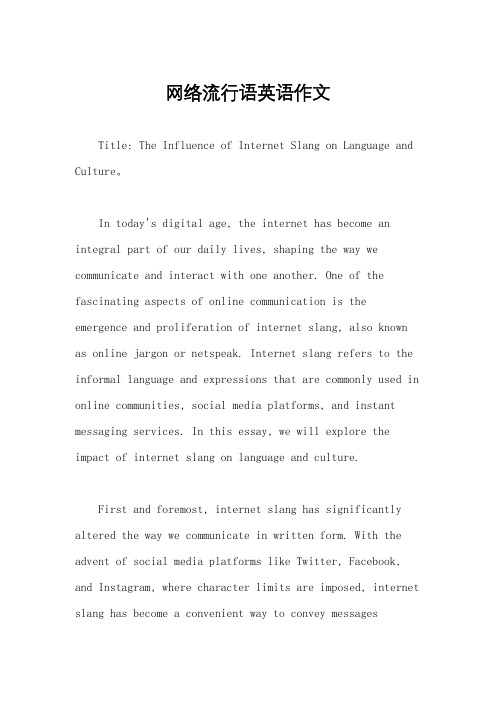
网络流行语英语作文Title: The Influence of Internet Slang on Language and Culture。
In today's digital age, the internet has become an integral part of our daily lives, shaping the way we communicate and interact with one another. One of the fascinating aspects of online communication is the emergence and proliferation of internet slang, also known as online jargon or netspeak. Internet slang refers to the informal language and expressions that are commonly used in online communities, social media platforms, and instant messaging services. In this essay, we will explore the impact of internet slang on language and culture.First and foremost, internet slang has significantly altered the way we communicate in written form. With the advent of social media platforms like Twitter, Facebook, and Instagram, where character limits are imposed, internet slang has become a convenient way to convey messagesconcisely and quickly. Acronyms such as "LOL" (laugh out loud), "OMG" (oh my god), and "BRB" (be right back) have become ubiquitous in online conversations, facilitating efficient communication in a fast-paced digital environment.Moreover, internet slang has fostered a sense of belonging and camaraderie among internet users, creating a unique online subculture with its own set of linguistic conventions and norms. Memes, which often rely on internet slang and humor, serve as cultural artifacts that areshared and reshared across various online platforms, reinforcing a sense of community among users. The widespread adoption of internet slang has blurred the boundaries between virtual and real-life interactions, as individuals incorporate these expressions into their everyday speech and writing.However, while internet slang enhances communicationand fosters online communities, it also poses challenges to traditional language norms and standards. Critics arguethat the prevalence of internet slang may lead tolinguistic degradation, as individuals prioritize brevityand informality over grammatical accuracy and clarity. Moreover, the rapid evolution of internet slang makes it difficult for language learners and non-native speakers to keep pace with the latest trends, exacerbating language barriers in online communication.Furthermore, internet slang has implications for cross-cultural communication and understanding. As internet slang often relies on cultural references and context-specific meanings, its usage may inadvertently exclude individuals from different cultural backgrounds or linguistic communities. For example, expressions like "FOMO" (fear of missing out) or "YOLO" (you only live once) may not resonate with individuals who are not familiar with Western pop culture or internet memes.In conclusion, internet slang has become an integral part of online communication, shaping the way we interact and express ourselves in the digital realm. While it facilitates efficient communication and fosters online communities, it also challenges traditional language norms and standards. As internet slang continues to evolve andpermeate various aspects of our lives, it is essential to strike a balance between embracing linguistic innovationand preserving linguistic diversity and inclusivity. Ultimately, understanding the impact of internet slang on language and culture allows us to navigate the ever-changing landscape of online communication more effectively.。
网络上流行的英语热词作文
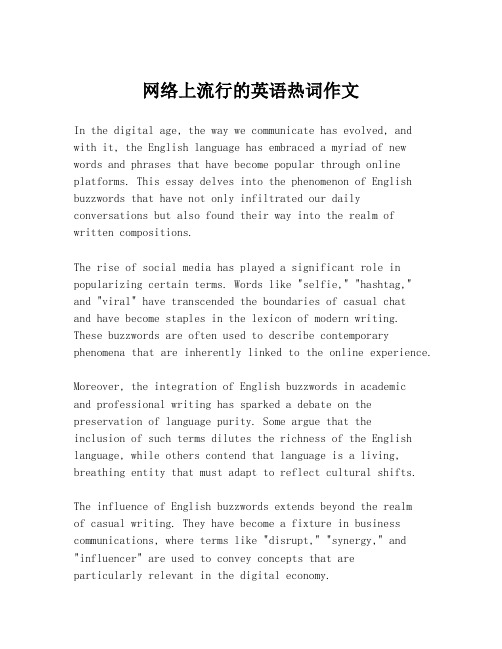
网络上流行的英语热词作文In the digital age, the way we communicate has evolved, and with it, the English language has embraced a myriad of new words and phrases that have become popular through online platforms. This essay delves into the phenomenon of English buzzwords that have not only infiltrated our daily conversations but also found their way into the realm of written compositions.The rise of social media has played a significant role in popularizing certain terms. Words like "selfie," "hashtag," and "viral" have transcended the boundaries of casual chatand have become staples in the lexicon of modern writing. These buzzwords are often used to describe contemporary phenomena that are inherently linked to the online experience.Moreover, the integration of English buzzwords in academicand professional writing has sparked a debate on the preservation of language purity. Some argue that theinclusion of such terms dilutes the richness of the English language, while others contend that language is a living, breathing entity that must adapt to reflect cultural shifts.The influence of English buzzwords extends beyond the realmof casual writing. They have become a fixture in business communications, where terms like "disrupt," "synergy," and "influencer" are used to convey concepts that areparticularly relevant in the digital economy.However, the use of these buzzwords in formal writing has its pitfalls. Overreliance on trendy terms can lead to a lack of clarity and precision, which is crucial in academic and professional settings. It is essential for writers to strike a balance between embracing new language and maintaining the integrity of their compositions.In conclusion, the phenomenon of popular English buzzwords in online compositions reflects the dynamic nature of language and its ability to adapt to new contexts. While these terms can enliven writing and make it more relatable to a contemporary audience, they should be used judiciously to ensure that the writing remains clear, informative, and effective. The key lies in understanding the context and the audience for whom the composition is intended.。
网络流行语的英语作文
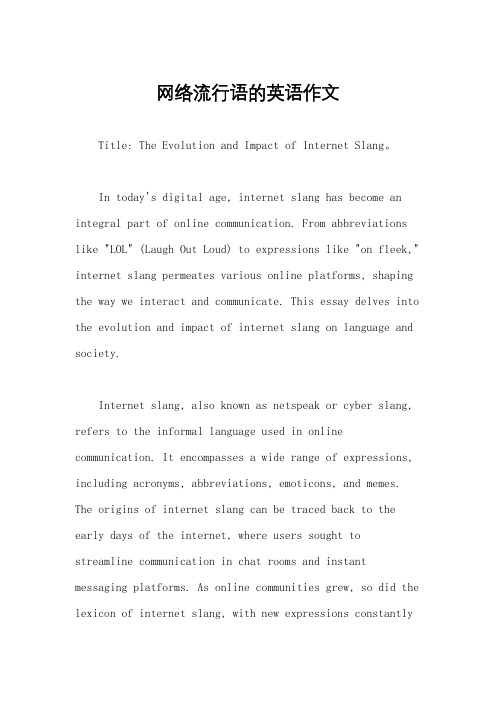
网络流行语的英语作文Title: The Evolution and Impact of Internet Slang。
In today's digital age, internet slang has become an integral part of online communication. From abbreviations like "LOL" (Laugh Out Loud) to expressions like "on fleek," internet slang permeates various online platforms, shaping the way we interact and communicate. This essay delves into the evolution and impact of internet slang on language and society.Internet slang, also known as netspeak or cyber slang, refers to the informal language used in online communication. It encompasses a wide range of expressions, including acronyms, abbreviations, emoticons, and memes. The origins of internet slang can be traced back to the early days of the internet, where users sought to streamline communication in chat rooms and instant messaging platforms. As online communities grew, so did the lexicon of internet slang, with new expressions constantlyemerging and evolving.One of the defining characteristics of internet slangis its dynamic nature. New terms are coined regularly,often inspired by popular culture, current events, or memes. For example, phrases like "YOLO" (You Only Live Once) and "FOMO" (Fear Of Missing Out) have gained widespread usage, reflecting contemporary attitudes and behaviors. Moreover, internet slang tends to spread rapidly through social media and online forums, facilitated by the interconnectedness of digital communication networks.The prevalence of internet slang has had a significant impact on language and communication patterns. On one hand, internet slang has democratized communication, allowing individuals from diverse backgrounds to engage in informal exchanges online. It has also fostered a sense of community among internet users, creating shared linguistic codes and insider jokes. However, internet slang can also be adouble-edged sword, as it may hinder effective communication in formal or professional settings.Furthermore, internet slang reflects broader cultural trends and social dynamics. Certain expressions may carry connotations related to gender, age, or subculture, influencing how individuals perceive and interpret online communication. For instance, slang terms associated with youth culture may alienate older generations, while expressions rooted in specific online communities may serve as markers of identity and belonging.The impact of internet slang extends beyond language and communication to influence various aspects of society. In the realm of marketing and advertising, companies often leverage internet slang to appeal to younger demographics and create viral marketing campaigns. Similarly, internet slang has permeated popular culture, with memes and catchphrases from online platforms making their way into mainstream media and entertainment.Moreover, the use of internet slang has implicationsfor education and literacy. Some educators argue that exposure to internet slang may hinder students' ability to communicate effectively in formal writing or academiccontexts. However, others suggest that incorporatingdigital literacy skills, including an understanding of internet slang, can enhance students' proficiency in navigating online spaces and engaging with digital media.In conclusion, internet slang has become a pervasive aspect of online communication, shaping language, culture, and society in profound ways. While internet slangfacilitates informal communication and fosters community building online, it also poses challenges in terms of linguistic diversity and effective communication across different contexts. As internet culture continues to evolve, so too will the lexicon of internet slang, reflecting the ever-changing landscape of digital communication.。
当代网络热词英语作文
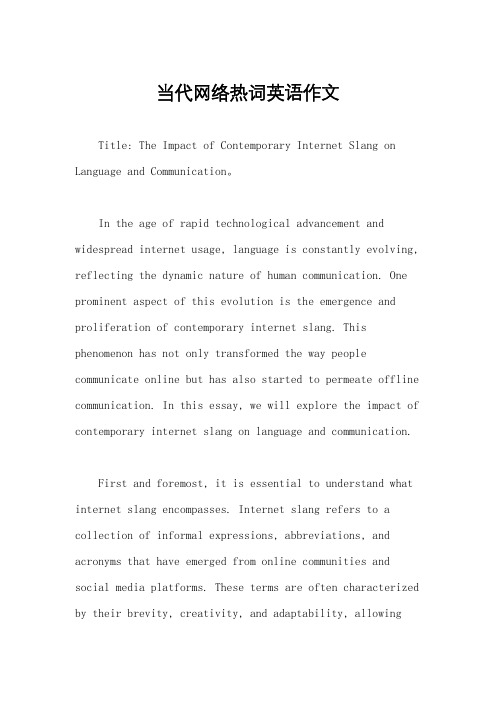
当代网络热词英语作文Title: The Impact of Contemporary Internet Slang on Language and Communication。
In the age of rapid technological advancement and widespread internet usage, language is constantly evolving, reflecting the dynamic nature of human communication. One prominent aspect of this evolution is the emergence and proliferation of contemporary internet slang. This phenomenon has not only transformed the way people communicate online but has also started to permeate offline communication. In this essay, we will explore the impact of contemporary internet slang on language and communication.First and foremost, it is essential to understand what internet slang encompasses. Internet slang refers to a collection of informal expressions, abbreviations, and acronyms that have emerged from online communities and social media platforms. These terms are often characterized by their brevity, creativity, and adaptability, allowingusers to convey complex ideas and emotions succinctly. Examples include "LOL" (laugh out loud), "BRB" (be right back), and "OMG" (oh my god).One of the most significant impacts of contemporary internet slang is its influence on linguistic norms and conventions. As internet slang becomes increasingly integrated into everyday communication, especially among younger generations, traditional rules of grammar and spelling are being challenged. For instance, the use of abbreviations and non-standard punctuation in formalwriting contexts, such as emails and academic papers, has become more prevalent. While some argue that this blurring of linguistic boundaries undermines the integrity of the language, others view it as a natural evolution reflective of changing communication patterns.Furthermore, internet slang has reshaped the way people express themselves and connect with others online. In the digital age, where brevity is often valued over verbosity, internet slang allows individuals to convey messagesquickly and efficiently. Emoticons and emojis, which areoften used in conjunction with slang terms, provide additional layers of meaning and emotional nuance, enhancing the overall communicative experience. As a result, online interactions have become more dynamic and expressive, fostering a sense of community and belonging among users.However, it is important to recognize that internet slang is not without its drawbacks. One potential concernis the potential for miscommunication and misunderstanding, particularly across cultural and generational divides.While internet slang may be familiar to digital natives, older generations and non-native speakers may struggle to interpret its meaning correctly, leading to confusion or unintended offense. Moreover, the rapid evolution ofinternet slang means that terms can quickly become outdated or obsolete, further complicating communication dynamics.Despite these challenges, it is clear that contemporary internet slang has become an integral part of modern communication. Its widespread use across various online platforms and social media networks underscores its significance as a cultural phenomenon. As languagecontinues to evolve in response to technological innovation and social change, internet slang will likely remain a central feature of digital discourse, shaping the way we communicate and interact in the digital age.In conclusion, the impact of contemporary internet slang on language and communication is profound and far-reaching. From influencing linguistic norms to reshaping online interactions, internet slang has fundamentally transformed the way we communicate in the digital age. While it presents challenges in terms of clarity and comprehension, its expressive power and cultural significance cannot be denied. As we continue to navigate the ever-changing landscape of digital communication, understanding and embracing internet slang will beessential for effective and meaningful engagement online.。
关于网络流行语的看法的英语作文

关于网络流行语的看法的英语作文全文共3篇示例,供读者参考篇1The Way We Talk on the InternetHi there! My name is Jamie and I'm 10 years old. Today I want to talk to you about the way kids like me speak on the internet and use different slang words and phrases. It's kind of a funny topic when you think about it - grown-ups are always saying "kids these days" and shaking their heads at how we communicate online. But to me and my friends, it just feels natural!Let me start by explaining what slang is. Slang refers to informal words and phrases that are more common in spoken language, especially by particular groups of people. On the internet, there are lots of slang terms that get shared around through social media, messaging apps, online videos and games. They spread like wildfire because they're fun, catchy and make you feel like part of an in-group.Some of my favorite slang words that everyone uses online are "slay" (to do something excellently), "vibe" (the mood oratmosphere), "salty" (bitter or upset) and "sus" (suspicious). Those are just the start - there's a huge dictionary of internet slang out there that's constantly growing and evolving. New slang pops up all the time and spreads through memes, viral videos and jokes. It's an endless trend that will likely never stop!I remember when I first started seeing slang phrases like "that's lit" (meaning that's amazing) and "I'm dead" (meaning I'm laughing uncontrollably). At first I was really confused, but then I realized it was just a new way that kids my age were expressing themselves online. Once you learn the latest slang, it becomes a shared language that makes conversing a lot more fun on apps and games.A lot of adults think internet slang is just a bunch ofmade-up gibberish. But to me, it's a creative way to communicate experiences and emotions that plain English doesn't fully capture. Like when I'm feeling "snatched" (looking super good) or I see something "crispy" (fresh and trendy). There's an art to coming up with slang terms that vividly express what you want to say.Of course, parents and teachers get worried that slang will become a bad habit that clouds our ability to speak and write properly. They have a fair point - if all I did was use slang, mycommunication skills would definitely suffer. That's why it's good to be able to "code-switch" between formal language for school or work, and informal slang when chatting with friends online.Slang also helps connect me with communities that I'm part of on the internet. Like when I'm playing online multiplayer games, using the right gaming slang helps me bond with my teammates and understand their callouts during matches. Or in my favorite streamers' chats, there's always hilarious new slang popping up that only we loyal fans know the meaning of. It breeds a sense of camaraderie, you know?At the end of the day, I don't think slang is just a fleeting trend. It's a evolving language that has been around for ages and will keep on changing with each generation. The version we use on the internet these days is just an extension of that, blending teenage informal speak with online memes and culture. explosionnumbersSo should you be worried about your kids using too much internet slang? Maybe just a little - but I also think it's just part of growing up in the digital age. As long as we know when to use it appropriately (and when not to), it's all just a bit of harmless fun between friends. It adds color and zest to our online conversations. And who knows, some of the slang your kidstaught you might even become a permanent part of the English language one day!Slang or not, my hot take is that communication is all about connecting with people and making yourself understood, whether that's online or IRL (in real life). And for me, nothing beats having a laugh with my besties using our shared dialect of memes, emotes and slang terms. Just plz don't ask me to stop anytime soon, okay? I'm begging you fam! That would be a mega-L (huge loss) if I couldn't keep sprinkling my speech with internet sass. I gotta stay osnatchemic (on-trend) you know what I'm saying?篇2The Weird and Wonderful World of Internet SlangHi there! My name is Jamie and I'm 10 years old. Today I want to tell you all about the crazy language that gets used online and in memes. Some of it is really confusing, but other bits are just plain funny!Things move super fast on the internet. New slang words, acronyms, and memes are constantly popping up and going viral. It can be hard to keep track of it all! By the time us kids havefigured out what the latest saying or joke means, it's often already becoming old news.One type of internet slang that's really popular right now is acronyms. You've probably heard some of the common ones like "lol" for "laughing out loud" or "brb" meaning "be right back." Those have been around for ages. But there are always new, zanier ones entering the online language too.Some of the sillier acronyms I've seen lately are "IWSN" ("I want santa now"), "PMJG" ("pardon my jibber gabber"), and "WLITAF" ("why life is the ask factory?"). Those don't really make any sense, which is part of what makes them funny meme-speak!Then there are the odd slang words that get big for a while before fading away. Like how a few years ago, everybody online was saying "slay" as an alternative to "awesome" or "cool." Or how my older sister always tells me how "yeet" used to be a big thing for expressing excitement. To yeet something was to throw it really hard, I'm told.The meanings of these slang terms can seem totally random. Why did "mid" become the new "mediocre?" Who decided "no cap" should mean "no lie?" I have no clue, but using bizarre language is part of what makes internet culture so entertaining.Of course, a lot of online slang these days comes from memes. You know, those crazy videos, images, or phrases that get shared over and over until they become viral sensations. Like the laughing Troll kid or the "Woman Yelling at Cat" couple.The text that gets added to memes is where some true masterpieces of nonsensical slang get created. One of my favorites is the phrase "he need some milk" which gets associated with images of people looking confused or scared. Or there's the recent "brain OP" meme, with "OP" standing for "overpowered." That one makes me laugh every time.Probably the single weirdest piece of meme slang I've encountered is "shloobishuggah." It seems to have originated from someone trying to sound out a jazzy bass line, and now it's become shorthand online for any kind of silly nonsense word. Using "shloobishuggah" in a sentence is the slang equivalent of improvising a meaningless riff while making jazz hands.My friends and I spend way too much time browsing memes and repeating the latest catchphrases from social media. We'll be out on the playground, goofing around and shouting "sheeeeeesh" at each other (that's slang for showing appreciation for something cool). Or we'll randomly yell "okay,boomer!" at our teachers if they do something remotely out of touch or old-fashioned. Haha, oops, my bad!I have to be honest though – a lot of this online lingo goes completely over my head. How does a grumpy looking animal with the words "claim to be sleep" count as humor? Your guess is as good as mine. And don't even get me started on whatever cryptobros are saying with all their monkey illustrations and number symbols. That's a whole other level of weird internet patois.As confusing and inaccessible as meme slang can seem, I still love how creative and unpredictable it all is. There's something undeniably fun about collective weirdness on such a massive scale. One minute, you're all making jokes about digital apes and pixelated punks. The next minute, that's all been cancelled and everybody's posting about beans or frogs for some reason. It's absolute madness!Who knows what new memes and strange ways of speaking will take over this year? There's no way to predict it, which is what makes internet culture so exciting. Will we all start using "zamn" and "sheeesh" ironically in 2023? Or will those slang words instantly become cringe and get replaced by something even more bizarre? Only time will tell.One thing is for sure: kids today are part of an amazing revolution in modern language. Online slang is evolving faster than any dictionary can keep up with. It's a living, evolvingsilly-speak that brings people together under a shared love of absurdity. Sure, a lot of it is incomprehensible gibberish. That's what makes it an absolute shloobishuggah!篇3The Weird World of Internet SlangYou know how grown-ups are always saying things like "kids these days" and shaking their heads? Well, I'm a kid, and I've got my own thoughts on how "these days" are different because of all the new internet slang words that have become popular. It's a totally weird world of abbreviations, misspellings, and made-up words that didn't exist back when my parents were kids.Take "LOL" for example. When I first saw that, I thought someone was just being a really bad speller. But then I learned it means "laughing out loud" and people use it to show they think something is funny in their texts and online messages. At first, I didn't get why we needed a whole new code word for laughing when the regular word works just fine. But now I'm totally guiltyof using "LOL" myself sometimes, especially when I'm trying to respond quickly.Then there's "IKR" which means "I know, right?" I overheard some older kids using that one on the playground last week and had to ask them what it meant. When they told me, I actually did know what they meant and agreed with their point, so I guess IKR made sense in that situation? But it seems like such a weird way to abbreviate such a simple phrase.My personal favorite funny internet slang term, though, has to be "YOLO." This crazy word is supposed to mean "you only live once," which I think is a pretty deep philosophical idea for the internet slang crowd to be broadcasting. Every time I see someone type "YOLO," I imagine them striking a dramatic pose like a famous philosopher from ancient times while wearing a vintage T-shirt and staring pensively into the distance. Yeah, real profound stuff there, YOLO dude.Of course, there are plenty of other bizarre internet slang terms out there, and new ones seem to be popping up all the time. There's "FOMO" (fear of missing out), "TBH" (to be honest), "LIT" (amazing or exciting), and way too many more to list. Half the time, I haven't got a clue what these abbreviations and made-up words even mean.I have to wonder, do we really need a completely new vocabulary just for typing out messages on our phones and computers? Don't get me wrong, I'm all about keeping up with the latest trends and fitting in with my friends and peers. But sometimes I think this internet slang revolution has gone a little too far. It's like we're rewriting the entire dictionary, one abbreviation at a time!And let's not even get started on how ridiculous some of these new slang words sound when you actually say them out loud. I accidentally let a few of them slip during an in-person conversation the other day, and my parents looked at me like I had literally started speaking another language. Which I kind of had, I guess? Imagine looking at your kid and hearing them say "that new game is super lit, but I have FOMO about missing the latest episode of my favorite show, so YOLO, IKR!" You'd probably be wondering what alternate universe they learned to communicate in.Despite all my joking, I actually don't mind using some of the more common internet slang terms once in a while when I'm chatting with my friends online or over text. They can be kind of fun and make me feel like I'm part of an exclusive club that has its own unique code words. And hey, maybe coming up withcreative new vocabulary is helping to expand our minds in weird and unexpected ways?But at the end of the day, I really do hope we don't completely abandon normal language and communication just because a bunch of shorthand text slang became popular on the internet. Whenever I'm writing something important for school or wanting to have a serious conversation, you can bet I'll be using actual complete words and sentences rather than a jumbled mess of letters and abbreviations.So while I may giggle at "YOLO" every now and then with my friends, I don't plan on adopting it as my new personal life motto anytime soon. Call me old-fashioned, but I still think there's a lot of value in being able to express yourself clearly using real words. Or as they would have said back in the ancient times... "LOL YOLO IKR?"。
网络用语 英语作文

网络用语英语作文1. Oh my gosh, I can't believe I just got "ghosted" by that guy I met on Tinder. I thought we had a real connection, but I guess not.2. Ugh, I have been "scrolling" through Instagram for hours and now I feel like I've wasted so much time. It's such a time-sucking app.3. I was "ROFL" when I saw that meme my friend sent me. It was so hilarious, I couldn't stop laughing.4. I really need to "unplug" and take a break from all this social media. It's so addictive and I feel like I'm constantly comparing myself to others.5. My mom just joined Facebook and now she's "friending" all my friends. It's so embarrassing, I wish she would just stay off social media altogether.6. I love using "emojis" when I text my friends. They just add so much more expression to the conversation.7. I can't believe how many "likes" I got on my latest Instagram post. It's crazy how validation from strangers can make you feel so good.8. I need to stop "stalking" my ex on social media.It's not healthy and it's just making it harder for me to move on.9. I hate it when people "subtweet" instead of just confronting the person they have a problem with. It's so passive-aggressive.10. I really need to "clean up" my social media profiles. I don't want potential employers seeing all the crazy stuff I post.。
网络用语英语作文
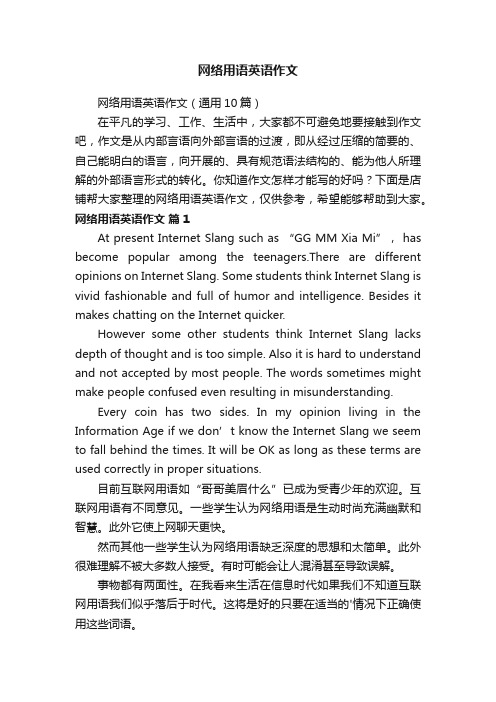
网络用语英语作文网络用语英语作文(通用10篇)在平凡的学习、工作、生活中,大家都不可避免地要接触到作文吧,作文是从内部言语向外部言语的过渡,即从经过压缩的简要的、自己能明白的语言,向开展的、具有规范语法结构的、能为他人所理解的外部语言形式的转化。
你知道作文怎样才能写的好吗?下面是店铺帮大家整理的网络用语英语作文,仅供参考,希望能够帮助到大家。
网络用语英语作文篇1At present Internet Slang such as “GG MM Xia Mi”, has become popular among the teenagers.There are different opinions on Internet Slang. Some students think Internet Slang is vivid fashionable and full of humor and intelligence. Besides it makes chatting on the Internet quicker.However some other students think Internet Slang lacks depth of thought and is too simple. Also it is hard to understand and not accepted by most people. The words sometimes might make people confused even resulting in misunderstanding.Every coin has two sides. In my opinion living in the Information Age if we don’t know the Internet Slang we seem to fall behind the times. It will be OK as long as these terms are used correctly in proper situations.目前互联网用语如“哥哥美眉什么”已成为受青少年的欢迎。
网络热词沉浸式作文
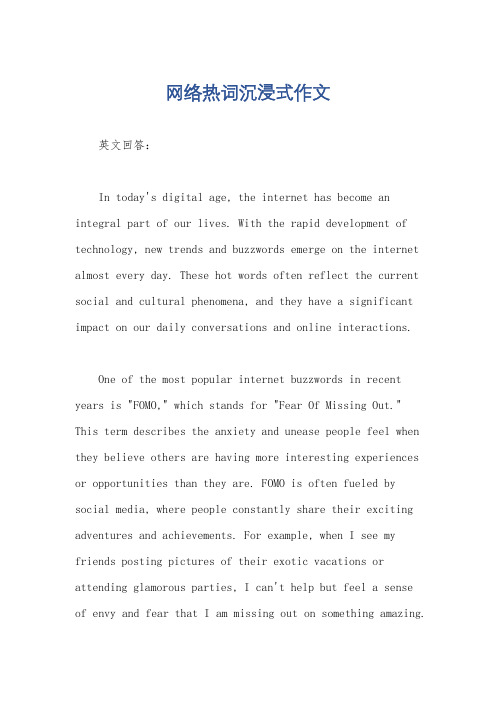
网络热词沉浸式作文英文回答:In today's digital age, the internet has become an integral part of our lives. With the rapid development of technology, new trends and buzzwords emerge on the internet almost every day. These hot words often reflect the current social and cultural phenomena, and they have a significant impact on our daily conversations and online interactions.One of the most popular internet buzzwords in recent years is "FOMO," which stands for "Fear Of Missing Out." This term describes the anxiety and unease people feel when they believe others are having more interesting experiences or opportunities than they are. FOMO is often fueled by social media, where people constantly share their exciting adventures and achievements. For example, when I see my friends posting pictures of their exotic vacations or attending glamorous parties, I can't help but feel a senseof envy and fear that I am missing out on something amazing.Another commonly used internet phrase is "YOLO," which stands for "You Only Live Once." This term encouragespeople to live life to the fullest and take risks without worrying about the consequences. YOLO has become a popular motto among young people, who use it as a justification for impulsive decisions or adventurous activities. For instance, when my friends and I decide to go skydiving or try extreme sports, we often shout "YOLO" to remind ourselves to embrace the moment and enjoy life without regrets.Furthermore, the internet has given rise to the concept of "cancel culture." This term refers to the practice of boycotting or ostracizing individuals or organizations that have said or done something considered offensive or problematic. The power of cancel culture lies in the collective voice of internet users, who can quickly spread information and rally support for or against a particular cause. For example, when a celebrity makes a controversial statement, social media users may start a hashtag campaignto call for their cancellation, leading to public backlash and potential career consequences.In addition to these examples, there are countless other internet buzzwords that have become part of our everyday vocabulary. From "LOL" to "selfie," these terms have not only changed the way we communicate but also shaped our culture and behavior. They have become shortcuts for expressing emotions, sharing experiences, and connecting with others online.中文回答:在当今数字时代,互联网已经成为我们生活中不可或缺的一部分。
网上热词的利与弊英语作文

网上热词的利与弊英语作文Title: The Pros and Cons of Internet Catchphrases。
In the age of the internet, catchphrases spread like wildfire. These short, catchy phrases capture the essence of various trends, memes, and cultural phenomena, often becoming ubiquitous in online discourse. While they serve as a form of cultural expression and entertainment, they also have their drawbacks. This essay delves into the advantages and disadvantages of internet catchphrases, drawing insights from the most downloaded online samples.### Introduction。
Internet catchphrases have become an integral part of online communication, shaping how we express ourselves and interact with others in virtual spaces. While they can be humorous and thought-provoking, they also carry implications for language, society, and digital culture.### The Advantages of Internet Catchphrases。
网络流行语的英语作文
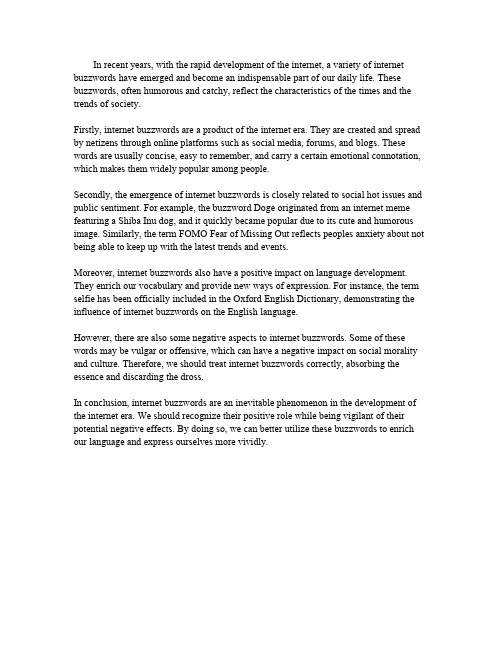
In recent years,with the rapid development of the internet,a variety of internet buzzwords have emerged and become an indispensable part of our daily life.These buzzwords,often humorous and catchy,reflect the characteristics of the times and the trends of society.Firstly,internet buzzwords are a product of the internet era.They are created and spread by netizens through online platforms such as social media,forums,and blogs.These words are usually concise,easy to remember,and carry a certain emotional connotation, which makes them widely popular among people.Secondly,the emergence of internet buzzwords is closely related to social hot issues and public sentiment.For example,the buzzword Doge originated from an internet meme featuring a Shiba Inu dog,and it quickly became popular due to its cute and humorous image.Similarly,the term FOMO Fear of Missing Out reflects peoples anxiety about not being able to keep up with the latest trends and events.Moreover,internet buzzwords also have a positive impact on language development. They enrich our vocabulary and provide new ways of expression.For instance,the term selfie has been officially included in the Oxford English Dictionary,demonstrating the influence of internet buzzwords on the English language.However,there are also some negative aspects to internet buzzwords.Some of these words may be vulgar or offensive,which can have a negative impact on social morality and culture.Therefore,we should treat internet buzzwords correctly,absorbing the essence and discarding the dross.In conclusion,internet buzzwords are an inevitable phenomenon in the development of the internet era.We should recognize their positive role while being vigilant of their potential negative effects.By doing so,we can better utilize these buzzwords to enrich our language and express ourselves more vividly.。
我的年度网络热词作文英文
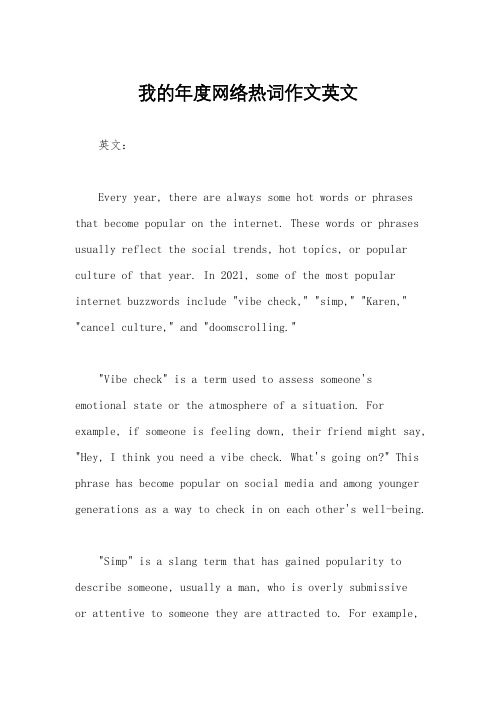
我的年度网络热词作文英文英文:Every year, there are always some hot words or phrases that become popular on the internet. These words or phrases usually reflect the social trends, hot topics, or popular culture of that year. In 2021, some of the most popular internet buzzwords include "vibe check," "simp," "Karen," "cancel culture," and "doomscrolling.""Vibe check" is a term used to assess someone's emotional state or the atmosphere of a situation. For example, if someone is feeling down, their friend might say, "Hey, I think you need a vibe check. What's going on?" This phrase has become popular on social media and among younger generations as a way to check in on each other's well-being."Simp" is a slang term that has gained popularity to describe someone, usually a man, who is overly submissiveor attentive to someone they are attracted to. For example,if a guy is constantly doing favors for a girl he likes, his friends might jokingly say, "Stop simping for her, man!" This word has sparked a lot of debate and discussion about gender dynamics and relationships."Karen" is a term used to describe a middle-aged, entitled woman who often makes unreasonable demands or complains about trivial issues. This term has been widely used to call out instances of privilege and entitlement, especially in customer service or public settings. For example, if a woman is causing a scene in a store over a small inconvenience, someone might say, "Oh, here comes a Karen.""Cancel culture" refers to the practice of publicly rejecting or boycotting individuals or entities that are deemed to have done something offensive or problematic. This term has been used to describe the online phenomenon of "cancelling" celebrities, public figures, or companies for their actions or statements. For example, if a celebrity makes a controversial statement, people might call for them to be "cancelled" by unfollowing them onsocial media and boycotting their work."Doomscrolling" is the act of endlessly scrolling through negative news or social media feeds, which can have a detrimental effect on mental health. This term became popular during the COVID-19 pandemic, as people were constantly consuming news about the virus and its impact. For example, if someone is constantly checking their phone for updates on bad news, their friend might say, "You needto stop doomscrolling and take a break from your phone."These internet buzzwords not only reflect the current cultural and social landscape, but they also shape the way we communicate and interact with each other online. They provide insight into the collective mindset and concerns of society, and they often spark important discussions about social issues and behaviors.中文:每年,总会有一些网络热词或短语在互联网上流行起来。
网络流行语 英语作文
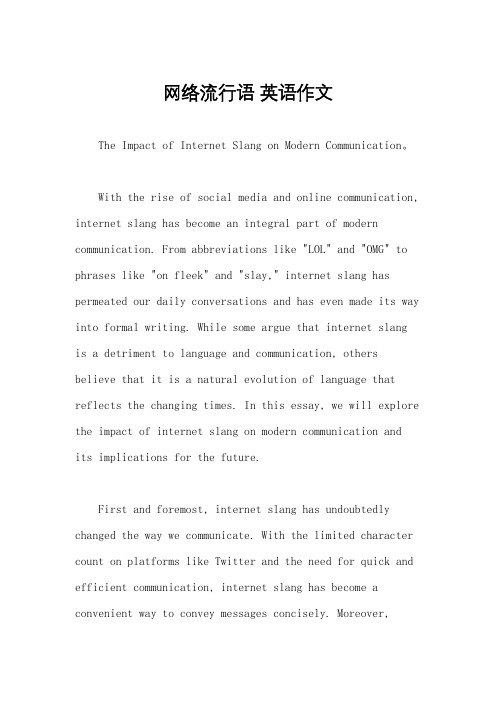
网络流行语英语作文The Impact of Internet Slang on Modern Communication。
With the rise of social media and online communication, internet slang has become an integral part of modern communication. From abbreviations like "LOL" and "OMG" to phrases like "on fleek" and "slay," internet slang has permeated our daily conversations and has even made its way into formal writing. While some argue that internet slangis a detriment to language and communication, others believe that it is a natural evolution of language that reflects the changing times. In this essay, we will explore the impact of internet slang on modern communication andits implications for the future.First and foremost, internet slang has undoubtedly changed the way we communicate. With the limited character count on platforms like Twitter and the need for quick and efficient communication, internet slang has become a convenient way to convey messages concisely. Moreover,internet slang has also created a sense of community and belonging among internet users. By using the same slang and understanding its meaning, individuals can connect and relate to one another, fostering a sense of camaraderie and shared experience.However, the prevalence of internet slang has also raised concerns about its impact on language and communication. Critics argue that internet slang promotes laziness and hinders proper language development. They believe that the overuse of slang can lead to a decline in vocabulary and grammar skills, as individuals rely on shortcuts and abbreviations to express themselves. Furthermore, internet slang can also be exclusionary, as those who are not familiar with the latest slang may feel left out or alienated from online conversations.Despite these criticisms, it is important to recognize that language is constantly evolving, and internet slang is simply a reflection of the changing times. Just as Shakespearean English differs from modern English, internet slang is a product of the digital age and the uniquecommunication needs it presents. Rather than condemning internet slang, we should embrace it as a vibrant and dynamic aspect of modern communication. After all, language is a living entity that adapts and grows with the times.In conclusion, internet slang has had a profound impact on modern communication. While it has changed the way we communicate and fostered a sense of community amonginternet users, it has also raised concerns about itsimpact on language and communication skills. However, it is important to recognize that language is constantly evolving, and internet slang is simply a reflection of the changing times. As we move forward, we should embrace internet slang as a natural evolution of language and strive to find a balance between its convenience and the preservation of proper language skills. Only then can we fully appreciate the richness and diversity of modern communication.。
英语作文对网络热词的看法
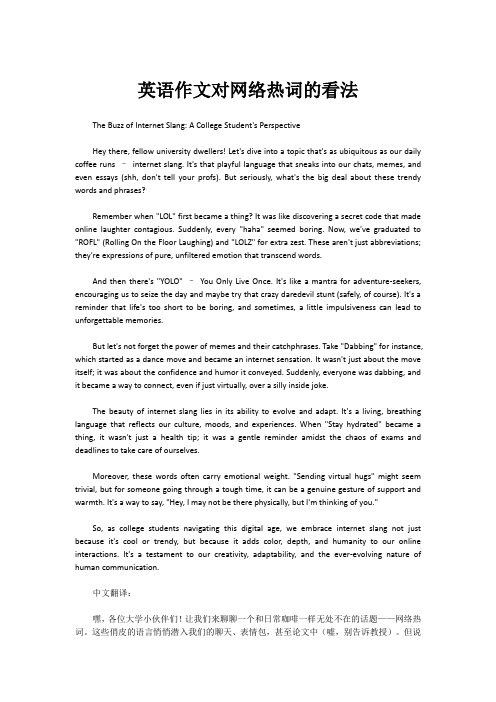
英语作文对网络热词的看法The Buzz of Internet Slang: A College Student's PerspectiveHey there, fellow university dwellers! Let's dive into a topic that's as ubiquitous as our daily coffee runs –internet slang. It's that playful language that sneaks into our chats, memes, and even essays (shh, don't tell your profs). But seriously, what's the big deal about these trendy words and phrases?Remember when "LOL" first became a thing? It was like discovering a secret code that made online laughter contagious. Suddenly, every "haha" seemed boring. Now, we've graduated to "ROFL" (Rolling On the Floor Laughing) and "LOLZ" for extra zest. These aren't just abbreviations; they're expressions of pure, unfiltered emotion that transcend words.And then there's "YOLO" –You Only Live Once. It's like a mantra for adventure-seekers, encouraging us to seize the day and maybe try that crazy daredevil stunt (safely, of course). It's a reminder that life's too short to be boring, and sometimes, a little impulsiveness can lead to unforgettable memories.But let's not forget the power of memes and their catchphrases. Take "Dabbing" for instance, which started as a dance move and became an internet sensation. It wasn't just about the move itself; it was about the confidence and humor it conveyed. Suddenly, everyone was dabbing, and it became a way to connect, even if just virtually, over a silly inside joke.The beauty of internet slang lies in its ability to evolve and adapt. It's a living, breathing language that reflects our culture, moods, and experiences. When "Stay hydrated" became a thing, it wasn't just a health tip; it was a gentle reminder amidst the chaos of exams and deadlines to take care of ourselves.Moreover, these words often carry emotional weight. "Sending virtual hugs" might seem trivial, but for someone going through a tough time, it can be a genuine gesture of support and warmth. It's a way to say, "Hey, I may not be there physically, but I'm thinking of you."So, as college students navigating this digital age, we embrace internet slang not just because it's cool or trendy, but because it adds color, depth, and humanity to our online interactions. It's a testament to our creativity, adaptability, and the ever-evolving nature of human communication.中文翻译:嘿,各位大学小伙伴们!让我们来聊聊一个和日常咖啡一样无处不在的话题——网络热词。
网络流行用词英语作文
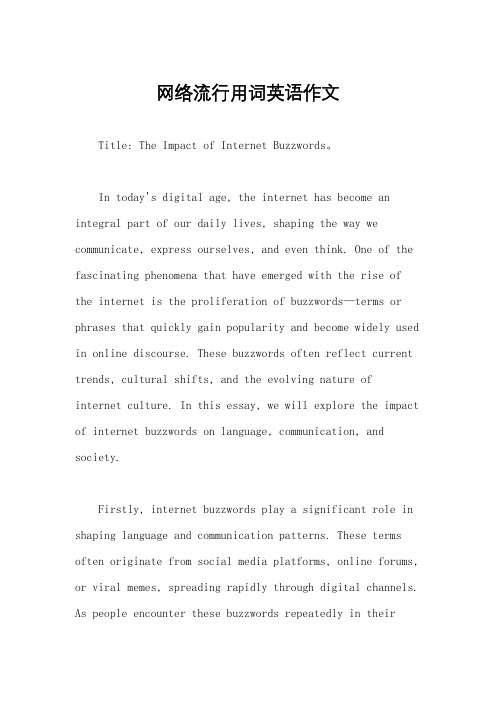
网络流行用词英语作文Title: The Impact of Internet Buzzwords。
In today's digital age, the internet has become an integral part of our daily lives, shaping the way we communicate, express ourselves, and even think. One of the fascinating phenomena that have emerged with the rise of the internet is the proliferation of buzzwords—terms or phrases that quickly gain popularity and become widely used in online discourse. These buzzwords often reflect current trends, cultural shifts, and the evolving nature ofinternet culture. In this essay, we will explore the impact of internet buzzwords on language, communication, and society.Firstly, internet buzzwords play a significant role in shaping language and communication patterns. These terms often originate from social media platforms, online forums, or viral memes, spreading rapidly through digital channels. As people encounter these buzzwords repeatedly in theironline interactions, they incorporate them into their vocabulary, leading to linguistic innovations and the evolution of language. For example, phrases like "on fleek," "savage," and "woke" have transitioned frominternet slang to mainstream usage, demonstrating the influence of online culture on everyday language.Moreover, internet buzzwords serve as cultural markers, reflecting the zeitgeist of the digital age. These terms encapsulate prevailing attitudes, values, and trends within online communities, providing insights into contemporary social phenomena. For instance, buzzwords like "cancel culture," "virtue signaling," and "FOMO" (fear of missing out) shed light on societal dynamics such as online activism, performative allyship, and the anxieties induced by social media.Furthermore, internet buzzwords have implications for identity construction and self-expression in the online realm. Individuals often use these terms to signal their belonging to specific online subcultures or to expresstheir personality and worldview. By adopting and usingpopular buzzwords, individuals align themselves with particular online communities, forging connections and building social capital within digital spaces. Conversely, the creation of niche buzzwords allows marginalized groups to reclaim language and assert their presence in online discourse, fostering inclusivity and empowerment.However, the widespread use of internet buzzwords also raises concerns about communication effectiveness and linguistic clarity. While these terms can facilitate communication within online communities, they may cause confusion or alienation for those unfamiliar with internet culture. Additionally, the rapid turnover of buzzwords can contribute to linguistic obsolescence, as once-popular terms quickly lose relevance and are replaced by new ones. This constant flux in language usage poses challenges for language learners and educators, who must navigate the ever-changing landscape of internet vernacular.Moreover, the use of internet buzzwords can perpetuate echo chambers and reinforce filter bubbles within online communities. When individuals exclusively engage withothers who share their familiarity with buzzwords and cultural references, they risk narrowing their perspectives and limiting exposure to diverse viewpoints. This phenomenon can contribute to polarization and tribalism in online discourse, hindering constructive dialogue and mutual understanding.In conclusion, internet buzzwords exert a significant influence on language, communication, and society in the digital age. These terms reflect cultural trends, shape linguistic innovations, and facilitate identity expression within online communities. However, their widespread use also poses challenges regarding communication clarity, linguistic inclusivity, and the fostering of diverse perspectives. As we navigate the complexities of internet culture, it is essential to critically evaluate the impact of buzzwords on language dynamics and strive for inclusive and meaningful communication in digital spaces.。
学生使用网络用语的原因英语作文
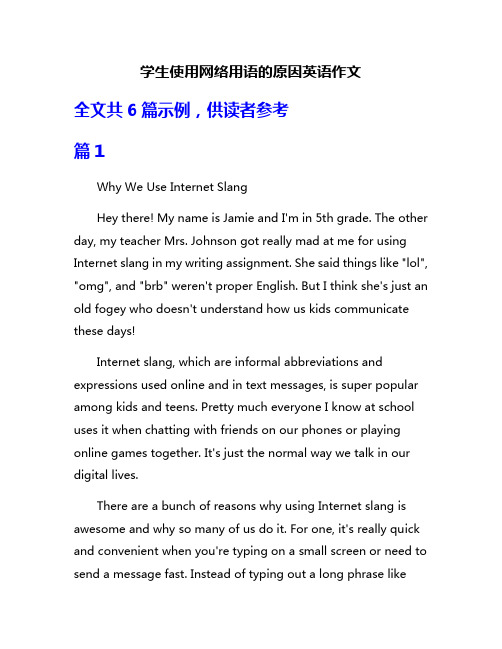
学生使用网络用语的原因英语作文全文共6篇示例,供读者参考篇1Why We Use Internet SlangHey there! My name is Jamie and I'm in 5th grade. The other day, my teacher Mrs. Johnson got really mad at me for using Internet slang in my writing assignment. She said things like "lol", "omg", and "brb" weren't proper English. But I think she's just an old fogey who doesn't understand how us kids communicate these days!Internet slang, which are informal abbreviations and expressions used online and in text messages, is super popular among kids and teens. Pretty much everyone I know at school uses it when chatting with friends on our phones or playing online games together. It's just the normal way we talk in our digital lives.There are a bunch of reasons why using Internet slang is awesome and why so many of us do it. For one, it's really quick and convenient when you're typing on a small screen or need to send a message fast. Instead of typing out a long phrase like"laughing out loud", you can just put "lol" to show you think something is funny. Little shortenings like that save a ton of time and effort.Plus, Internet slang is the language we all understand best. We've basically been texting and going online since we were tiny! The slang terms and abbreviations are sort of hardwired into our brains at this point. When I see "omg" I instantly know what it means without having to think about it. Using standard English can feel weird and unnatural when I'm communicating casually with my peers.Another big reason Internet slang is so widespread is because it's fun and creative! There are tons of hilarious and silly slang terms out there to perfectly express any emotion or situation. Like when something is really exciting, I'll say "zomg" which is way more exaggerated than a boring old "oh my god." Or if I think someone is being dumb, I can just hit them with an "smh" which means "shaking my head." The slang is always evolving too, with new funny sayings and memes constantly popping up to describe modern life and experiences.Using Internet slang is also a way for us kids to have our own distinct culture and way of communicating. It's kind of like a secret code that only young people fluent in digital language canfully understand. When we use niche slang terms from particular websites or games, it's a signal to others that we're part of that same online community and all the inside jokes that go along with it. The slang helps us fit in and relate to each other across online spaces in a way that transcends physical locations. It's a huge bonding experience being able to seamlessly chat in the same lingo as your internet friends met through gaming or whatnot.Of course, there are times when Internet slang isn't appropriate and standard English should be used instead, like at school or at a job. But in our everyday casual conversations with friends and for most online activities, the slang is simply much more relevant and natural for expressing ourselves these days. It's the language of the Internet, which is where a huge part of our social lives as kids takes place now. So you can't really fault us for using it!I get that a lot of adults think Internet slang is silly, improper, or that we're just being lazy by abbreviating words. But from my perspective, it's a very useful and creative way of communicating that fits in perfectly with how my generation operates in the digital world. We don't really think about it as "slang" per se - It's just how we speak online! Sure, we'll turn on the propergrammar and spelling for essays or emails to teachers. But when we're casually chatting with friends, why shouldn't we use the vocabulary that we're most familiar and comfortable with?So while Mrs. Johnson may keep ranting that Internet slang"destroys the English language" or whatever, I think it's here to stay and will only keep evolving as we grow up. It's a huge part of our culture and identity as young people nowadays. Using slang online is just second nature to us after being immersed in the Internet and texting basically since birth. Maybe by the time I'm a parent, the teachers will have finally accepted "lol" and "omg" as real words! But for now, I'll keep using my fav slang with my friends online and off. Sry adults, but you'll just have to deal with it! Yeet!篇2The Reasons Why Students Use Internet SlangOMG, do you ever wonder why we kids use so much slang these days? It's cray cray, but there are actually some solid reasons behind all those weird internet abbreviations and made-up words we say. Let me break it down for you!First off, using slang is just way more fun than speaking all properly like adults do. It's lit fam! Saying something basic like"I'm going to my friend's house" is so boring. But if you say "I'm gonna hang at my bestie's crib" - that's fire! It makes everything sound cooler and more exciting. And let's be real, kids love anything that feels cool and exciting. It makes us feel like we're part of a special club with our own secret language. It's like a code that only we understand, you feel me?Plus, slang helps us relate to each other better and feel like part of the squad. When we're all using the same slang words and phrases, it creates a bond between us. It's kinda like an inside joke that only our generation gets. If I say "That new video game is straight fire!" my friends know exactly what lit feeling I'm trying to express. But if I used some ancient old person words like "I find that new video game very enjoyable!" they'd probably just look at me like "Huh? Who even talks like that?" Using the same slang lingo brings us closer together as friends for sure. No cap.Another major reason kids get obsessed with slang is because we love being different from adults and parents. We can't help it, we're just naturally rebellious like that! Grown-ups are always telling us "Don't say 'on fleek'! That's not proper English." But that's exactly why we want to say it even more! Slang gives us a way to have our own unique way ofcommunicating that's separate from how our teachers and parents talk. It's our way of expressing our independence and individuality. So sorry adults, but you can bet your bucks we're never gonna quit saying "it slaps" or "that's a whole mood" any time soon!Speaking of adults not understanding us, internet slang also lets us create sort of a secret code that they can't decode very well. We love watching them get all confused when we're talking about "going ghost" or "spilling the tea." It's like we're speaking in some sort of untranslatable alien language to them. And that's kind of the point - slang gives us privacy to communicate without rents or teachers fully understanding. We can low-key gossip or throw shade in front of them and they'll have no clue what we're actually saying! It's genius if you ask me.Ooh, another big factor is that slang helps us keep up with what's trendy and fresh. Using slang that's outdated or from last year makes you look like a total loser, seriously. We're always coining new words and phrases to replace the old ones that become lame or cringey. If you're not on the cutting edge with the latest lingo, you're basically a fossil, no cap. Slang keeps our language evolving and staying hip to what's poppin'.You'd be shook how much slang also helps us get our point across in a more concise way. Think about it - saying something like "That homework was horrible and frustrating" takes way more effort than just exclaiming "That homework was trash!" Same meaning, but way fewer words and way more impact. Using slang is basically linguistic shorthand that lets us express big ideas and emotions super quickly. For kids who are obsessed with efficiency and having minimal attention spans, that's a game-changer for sure.And let's keep it 100 here, slang is just straight up hilarious sometimes! Saying absurd, ridiculous phrases like "That food is snatched" or "Sis, you need to yeet yourself out of here" never fails to make our whole friend group crack up. Slang is our way of being funny, ironic, goofy and just straight up weird together. It turns communication into a constant inside joke. If we spoke like dictionary definitions all the time, the world would be mad boring my dudes.At the end of the day though, slang is simply how we communicate in the digital age. So much of our social lives happen online through apps, games, messaging and social media. And the online world moves at turbo speed with new memes, jokes and lingo spawning every few seconds. Kids haveto use slang and abbreviations to keep up with this rapid fire pace of internet content. "LOL", "IRL", "FOMO" - these shorthand codes are the language of the web, plain and simple. If we didn't use them, we'd basically be off the grid grandparents.So those are the real reasons we Gen Z kids are so obsessed with using slang. It's fun, it bonds us together, it's a way to rebel, it keeps us private from adults, it's trendy, it's concise, it's hilarious and it's just how we communicate online. To all the salty parents out there who hate on our slang: sry not sry, but this is just how we do. Get with the prorgram or get lost, mkay? Slang is here to slay!篇3Why We Use Internet SlangHi! My name is Jamie and I'm in 5th grade. Today I want to talk to you about something that is super important to kids my age - internet slang! You've probably heard your kids or grandkids using weird made-up words like "lit," "slay," "oof," and "sus." Well, I'm here to explain why we love using this crazy internet lingo so much.First of all, it's fun and expressive! Regular language can be kind of boring sometimes. But with internet slang, we can getreally creative in how we express ourselves. Like if something is really good, we can say it's "fire" or "poggers." Or if we think something is dumb, we can say "that's cap" or "big yikes." It adds so much more color and personality!Another big reason is that it helps us feel like part of a community and culture. When you use the same slang as your friends, it's like a special code you all understand. It brings you closer together and creates a bond. If you don't know the lingo, you kind of feel like an outsider. But once you learn it, you're instantly part of the in-crowd!It's also really useful for expressing emotions in a concise way online and in texts. Like if I just put a "lol" at the end of a message, you know I'm joking around. Or a well-placed "smh" lets you know I'm disappointed in something. With only a few letters, you can convey a whole feeling!Plus, using this shorthand slang helps us communicate faster in general. We don't have time to write out full words and sentences when we're rapidly chatting with our friends online. Abbreviations like "imo," "idk," and "brb" help us get our point across way quicker.I think another factor is that slang language just feels more casual and relaxed. The strict rules of formal writing can makeyou feel kind of uptight and stressed out. But with internet slang, there are no rules! You can creative and break conventions however you want.It's kind of like a retaliation against the boring, dry way adults use language too. You won't catch any of us saying things like "I cannot" or "do not." We'd much rather throw in some slang and say "I can't" or "don't" instead. It's more casual and youthful and rebels against uptight adult conventions.Slang also lets us show off how internet-savvy and culturally-relevant we are. If you don't understand the latest lingo from Instagram, TikTok, and Twitter, it's kind of like you're not truly immersed in internet culture. Staying on top of new slang proves you're really dialed into what's hot and trendy in the online world right now.And let's be real - slang is just mad funny sometimes! Why would we say "oh no" like a boring grown-up when we could say "sheesh" or "ope" instead? It's way funnier and more amusing. Part of being a kid is being silly and goofy, and slang is a perfect way to add more humor and entertainment to our conversations.Of course, I'm sure a lot of adults think our slang is ridiculous and makes no sense. My parents are always nagging me about "speaking properly" and not "making up words." But that's kindof the point! We get to have our own separate language and culture away from the way adults do things. It makes us feel independent and expressive.I'm sure plenty of slang I use now will be considered super cringey in just a few years too. That's just how it goes! Cool slang becomes outdated really fast as new trends and new words take over. It's a constantly evolving phenomenon that keeps up with how we speak and what's popular in media and culture.Ultimately though, I don't think our love for slang is all that different from how adults use certain slang or informal language too. You've probably heard grown-ups say things like "my bad," "no worries," or "dude" before. It's just that our version changes way faster to follow what's hot and viral on the internet!So there you have it - the reasons we crazy kids are so obsessed with using internet slang. It expresses our emotions, creates a community, speeds up conversations, lets us be casual and funny, feels independent from adults, and helps us show off our internet cultural knowledge. Our slang may sound odd to you now, but I bet you'll be calling things "cheugy" and "mid" before you know it!wink篇4Why Kids Use Internet SlangHiya! My name is Emma and I'm 10 years old. I love using internet slang when I chat with my friends online and text my parents. Some grownups don't really get why us kids love to mix upp letters and use silly words. But I'm going to explain all the rly awesome reasons we do it!First of all, internet slang is just fun and keeps our conversations exciting. Using the same boring words over and over is mega dull. But when you mix things up with slang, it makes chatting way more interesting and amusing. Like instead of saying "that's cool", you can say "that's lit" or "that slaps." See, doesn't that just make you smile more? Using slang is a nice way to add some flavor and personality to your messages.Another reason kids use slang is because it helps us feel like we're part of a crew. Slang gives us a sort of secret code that only our friends understand. When you use particular words and phrases, it's like a badge that shows you're part of the in-group. If someone isn't using the slang, they might be an outsider or just not that cool. Slang helps us recognize the other hip andtrendy kids out there. It's kinda like a special handshake, but for the internet.Slang also allows us to abbreviate words to type faster. I mean, who has time to write out entire words these days when we're snapping with our BFFs? It's so much easier (and faster!) to just type "idk" instead of "I don't know." The same goes for "lol" instead of "laughing out loud." With so much of our conversations happening through screens and keyboards now, shortcuts like slang help us keep up. No one wants to be a slow typer in the group chat!Besides keeping up with our friends, using slang highlights that we're different from adults and their old-fashioned language. It's a way for us kids to have our own unique style and rebel just a lil bit. Like when I use "slay" instead of "awesome", it separates me from my parents and their cringe way of talking. No offense to them, but moms and dads just don't understand fresh slang the way we do as kids. Using it makes us sound cooler and more with the times.Lastly, slang on the internet is always evolving and changing rapidly. There's constantly new funny words and phrases popping up to express ourselves better. Like just last week, "it's the _______ for me" became a big trend for calling out ridiculousstuff. Being good at using proper slang shows that you're really tuned into internet culture at the moment. If you're still saying "YOLO" from like 5 years ago, that's a mega cringefest. Kids want to use the newest, hottest slang to prove we're not lame and outdated.So in conclusion, those are the main reasons why us students love to use special internet lingo in our messages. It makes chatting more amusing, brings us closer to our friends, helps us type faster, separates us from adults, and keeps us feeling relevant with the latest trends. Honestly, slang is just such a vibe.I can't even imagine regularly typing with perfect grammar and spelling these days. It would be so basicc and not ftw (that means "for the win" btw). So I'll keep using silly abbreviations, mixing upp letter caSes, and incorporating random new slang words, tmr and 4evr! That's just how we kiddos do it on the world wide web, you digggg?篇5Here's an essay of around 2,000 words on why students use internet slang, written from a child's perspective:Why Do We Use Internet Slang? An Essay by a KidYou know what's really cool? Internet slang! It's like a whole new language that grown-ups don't always understand. My friends and I use it all the time when we're chatting online, texting, or even talking in real life. It's super fun and makes me feel like I'm part of a secret club. Let me tell you all about it!First of all, internet slang is just so much easier and faster to type or say than regular words. Like, instead of typing "laugh out loud," we just say "lol." That's way quicker, right? And when you're in the middle of an intense gaming session or trying to keep up with a crazy group chat, every second counts! Plus, some of the slang words are just hilarious. "Yeet" means to throw something really hard, and "slay" means to do something really well. Doesn't that make you giggle?Another reason we love internet slang is that it helps us feel closer to our online friends and communities. When you're part of a Roblox crew or a Minecraft server, using the same slang makes you feel like you belong. It's like a secret code that only your squad understands. And let's be real, feeling like you're part of a tight-knit group is super important when you're a kid.Speaking of feeling like you belong, internet slang also helps us express ourselves in a way that feels authentic and true to who we are. We're not just parroting what adults say; we'recreating our own language and culture. It's a way for us to assert our individuality and show the world that we're not just little kids anymore. We're growing up and finding our own voices, and internet slang is a big part of that.Of course, some grown-ups just don't get it. They think we're being lazy or disrespectful when we use slang. But that's not it at all! We're just trying to communicate in a way that feels natural and fun to us. It's not that we don't know how to use "proper" language – we do that in school all the time. It's just that when we're hanging out with our friends, we want to speak our own language.And let's be honest, some of the slang words are just way more expressive than the boring old words adults use. Like, if I tell my mom that a new video game is "fire," she'll know I mean it's really good and exciting. If I just said "good," she might think it's only so-so. Internet slang lets us express ourselves in a more vivid and creative way.Plus, using slang is a way for us to bond with our friends and have a laugh. It's like an inside joke that only our crew understands. When we're feeling silly or just want to goof around, throwing in a few slang words is the perfect way to do it.It's all in good fun, and it's a huge part of what makes being a kid so great.Of course, we know that there's a time and a place for internet slang. We wouldn't use it in a school essay or when talking to our teachers (well, most of the time). But when we're just hanging out with our friends, either online or in person, it's the perfect way to communicate and express ourselves.So, there you have it: the reasons why us kids love using internet slang. It's faster, funnier, and helps us feel like we're part of something special. It's a way for us to assert our individuality and bond with our friends. And most importantly, it's just really, really fun.Sure, the grown-ups might not always get it. But that's okay – internet slang is our thing. It's a way for us to create our own little world, where we can be ourselves and communicate in a way that feels true to who we are. So the next time you hear us talking about "yeeting" or "slaying," just know that we're not being disrespectful or lazy. We're just being kids, and having a blast doing it.Slay on, my friends. Slay on.篇6Why We Use Internet SlangHey guys! Do you ever wonder why we say things like "lol," "brb," and "jk" when we're texting or chatting online? It's because we use a bunch of abbreviations and weird words that adults call "internet slang." Let me explain why we do this and give you some examples. It's actually pretty interesting!The main reason is that it's just faster and easier to type short little words instead of the long ones. When you're rapidly messaging back and forth with your friends, you don't want to type out every single word fully. It would take forever! By using abbreviations like "brb" for "be right back" or "lol" for "laughing out loud", we can get our point across much quicker.It also just feels more casual and relaxed compared to using perfect spelling and grammar all the time. I mean, we're just chatting and joking around with our buddies, not writing a school essay. Things like "lmao" (laughing my assets off) and "rofl" (rolling on the floor laughing) make it seem more like we're actually talking face-to-face instead of typing.Another big reason is that it makes us feel like we're part of our own little internet culture and community. All of these unique slang terms started online and then spread by people using them more and more. So when we say "gg" for "goodgame" or "noob" for an inexperienced player, it's kind of like a secret code that only gamers and internet users really understand. It makes us feel special and separates us from the non-internet adults who don't get it.Plus, making up crazy new slang words is just fun! We love taking ordinary words and abbreviating them in weird ways to create new ones with different meanings. Like how "sus" went from the regular word "suspicious" to meaning anything dubious or questionable. Or how "doggo" and "pupper" became cute nicknames for dogs. Coming up with silly slang makes chatting way more entertaining.Now let me give you a few more examples of super common internet slang terms we use:"Sry" = Sorry"Ikr" = I know, right?"Tl;dr" = Too long; didn't read"Smdh" = Shaking my damn head"Fam" = Friends/buddies"Slay" = You did something excellently"Tea" = Gossip"Sic"= Indicating that a misspelled word was intentional"Ship" = To want two people to be in a relationship"Extra" = Over the top"Savage" = An awesome clapback or insultSee what I mean? We've created a whole vocabulary of shortened slang that has its own logic and meanings. I bet lots of these made zero sense if you're not familiar with internet language!Of course, not everybody loves all this slang. Some teachers and parents get annoyed that we don't use proper English. They think it's lazy and will make us worse at writing in the long run. A few of my friends' parents have even banned them from using so much slang.But in my opinion, as long as we know when it's appropriate to use it and when we need to be more formal, internet slang isn't a bad thing at all. It's our own unique way to communicate quickly and creatively with each other online. We're just adapting language to fit how we live part of our lives on the internet and through texting now.So the next time you see one of us typing things like "omw" (on my way), "hmu" (hit me up), or "lit" (amazing), don't beconfused! We're just exercising our generational right to make up new styles of casual talking and writing. The internet age calls for an internet language, am I right? Lmk what you think!TTYL, fam!。
高考作文网络热词英语范文

高考作文网络热词英语范文With the rapid development of the Internet, a large number of internet neologisms and buzzwords have emerged. These words have become popular among people and have greatly influenced their daily lives and communication. In this essay, I will discuss some of these popular internet buzzwords and their impact on society.Firstly, let's take a look at the buzzword "fake news". In the era of information explosion, it has become increasingly difficult to distinguish between true and false information. Fake news refers to false information that is disseminated on the internet with the intention to deceive or mislead people. The impact of fake news can be devastating, as it can influence people's opinions and beliefs, and even lead to social unrest. Therefore, it is important for people to be critical and discerning when encountering news online.Another popular buzzword is "viral". When something goes viral on the internet, it means that it spreads rapidly and widely among internet users, often through social media platforms. Videos, memes, and even news articles can go viral, attracting the attention of millions of people. This phenomenon has both positive and negative effects. On the one hand, it can help promote social issues and raise awareness on certain topics. On the other hand, it can also lead to the spread of misinformation and rumors.In recent years, "influencers" have become another buzzword on the internet. Influencers refer to individuals who have gained a large following on social media platforms and have the ability to influence people's opinions and buying behaviors. They oftencollaborate with brands and promote products or services through their platforms. While influencers can provide valuable insights and recommendations, there is also the issue of authenticity and transparency. It is important for consumers to critically evaluate the authenticity and credibility of influencers' recommendations before making purchasing decisions."Meme" is another buzzword that has gained popularity online. Memes are humorous images, videos, or text that are shared and spread rapidly on social media. They often reflect current events or popular culture and are a form of online entertainment. Memes can bring people together through humor and create a sense of belonging in online communities. However, they can also be misused to spread hate speech or offensive content, which can have negative consequences on individuals and society as a whole.Lastly, "cancel culture" has become a buzzword that is frequently discussed online. Cancel culture refers to the act of publicly boycotting and shaming individuals or organizations for their controversial opinions or behaviors. While the intention behind cancel culture is often to hold people accountable for their actions, it can also lead to mob mentality and the violation of freedom of expression. It is important to foster a culture of open dialogue and understanding, rather than resorting to canceling individuals based on their differing opinions.In conclusion, internet buzzwords and neologisms have greatly influenced society and communication. While some buzzwords can have positive effects, such as raising awareness and promoting social issues, there are also negative aspects to be mindful of. It isimportant for individuals to be critical and discerning consumers of online content, and to use internet neologisms responsibly to foster open dialogue and understanding.。
- 1、下载文档前请自行甄别文档内容的完整性,平台不提供额外的编辑、内容补充、找答案等附加服务。
- 2、"仅部分预览"的文档,不可在线预览部分如存在完整性等问题,可反馈申请退款(可完整预览的文档不适用该条件!)。
- 3、如文档侵犯您的权益,请联系客服反馈,我们会尽快为您处理(人工客服工作时间:9:00-18:30)。
关于网络热词的英语作文
(1)如今网络流行语频频掀起风潮,热的一塌糊涂。
(2)网络热词是否该在考试作文中被考生频繁使用。
(3)你的看法。
例文:
In such a networked society, people are tend to use hot words on the internet, which has been tagged with fashion and trend. These buzzwords are formed with the popularity of internet, which means that without the internet those works make no sense. But we can’t deny that they do enrich our communication words and contribute a lot in entertaining people. Internet buzzwords are extremely popular in the internet used by netizens, especially in the microblog, even in the students’ examination paper.
In my point of view, internet buzzwords are undoubtedly hot and fashionable on the internet, but in the real life people are not so familiar with those words. Some people feel puzzled at those words. In other words, internet buzzwords can only make sense with the context of internet. Therefore, these words are limited in certain condition and can’t be generalized for their unfamiliarity to some people. They aren’t supposed to be
encourage d in the students’ examination paper, which is formal and should be taken seriously.
在这样一个网络的社会,人们都倾向于使用互联网上的热词,已被标记的时尚和潮流。
这些流行语的形成与互联网的普及,这意味着,这些作品没有互联网就没有任何意义。
但是,我们不能否认,他们丰富了我们的沟通的话,贡献了很多有趣的人。
网络流行语网民在互联网上使用的是非常受欢迎,尤其是在微博,甚至在学生的试卷。
在我的角度来看,网络流行语无疑是在互联网上热和时尚,但在现实生活中,人们不那么熟悉的那些话。
在这些话有些人感到困惑。
换言之,互联网流行语只能意义与互联网的上下文中。
因此,这些词被限制在一定的条件下,他们不熟悉对某些人来说,不能一概而论。
他们不应该得到鼓励,学生的试卷,这是正式的,应该认真对待。
